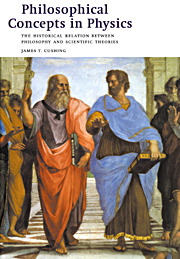 Philosophical Concepts in Physics
Philosophical Concepts in Physics Book contents
- Frontmatter
- Contents
- Preface
- Copyright acknowledgments
- PART I The scientific enterprise
- PART II Ancient and modern models of the universe
- PART III The Newtonian universe
- PART IV A perspective
- 10 Galileo's Letter to the Grand Duchess
- 11 An overarching Newtonian framework
- 12 A view of the world based on science: determinism
- PART V Mechanical versus electrodynamical world views
- PART VI The theory of relativity
- PART VII The quantum world and the completeness of quantum mechanics
- PART VIII Some philosophical lessons from quantum mechanics
- PART IX A retrospective
- Notes
- General references
- Bibliography
- Author index
- Subject index
12 - A view of the world based on science: determinism
Published online by Cambridge University Press: 05 June 2012
- Frontmatter
- Contents
- Preface
- Copyright acknowledgments
- PART I The scientific enterprise
- PART II Ancient and modern models of the universe
- PART III The Newtonian universe
- PART IV A perspective
- 10 Galileo's Letter to the Grand Duchess
- 11 An overarching Newtonian framework
- 12 A view of the world based on science: determinism
- PART V Mechanical versus electrodynamical world views
- PART VI The theory of relativity
- PART VII The quantum world and the completeness of quantum mechanics
- PART VIII Some philosophical lessons from quantum mechanics
- PART IX A retrospective
- Notes
- General references
- Bibliography
- Author index
- Subject index
Summary
As we indicated previously in Chapter 3, there is an element of belief in the very foundation of what is usually seen as the objective scientific enterprise. Traditionally, science has assumed that basically simple laws exist that explain the myriad phenomena of nature. This is a belief and science cannot prove it is a correct one. Throughout the history of Western thought there has been a tendency to reduce the phenomena of nature to a few simple laws or principles. One obvious motivation for this could well be a desire or felt need to make the world seem understandable to us. Today it is not uncommon to see the claim made that modern man has a view of the world based on science and that science has replaced religion. In addition to its acceptance of a basic simplicity in the fundamental laws of nature, this world view is often characterized as being philosophically materialistic, in the sense that matter and its interactions are regarded as comprising the entire universe, with the mind (or spirit) assigned a dependent reality (if any at all). Such a description of the world is typically taken, especially in older writing, to be completely deterministic, although quantum mechanics is widely believed to have changed this aspect of the philosophical materialism of modern science. (We return to determinism versus indeterminism in the quantum world in Chapters 21–24.)
- Type
- Chapter
- Information
- Philosophical Concepts in PhysicsThe Historical Relation between Philosophy and Scientific Theories, pp. 164 - 180Publisher: Cambridge University PressPrint publication year: 1998
